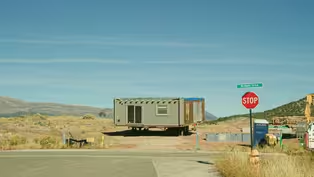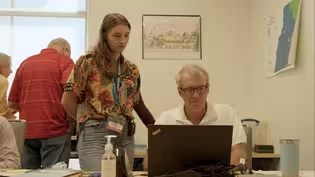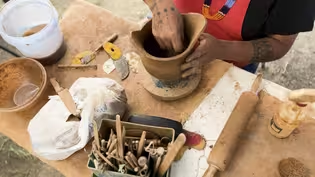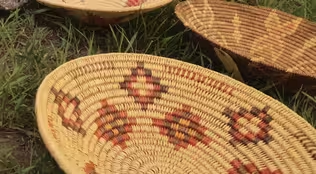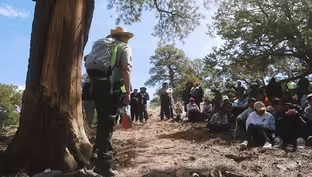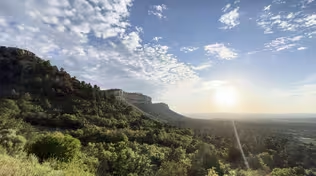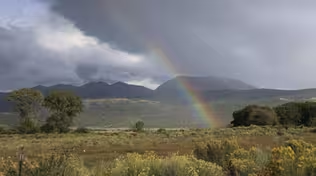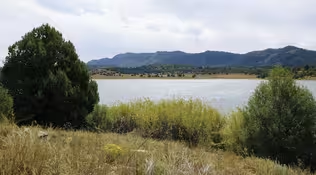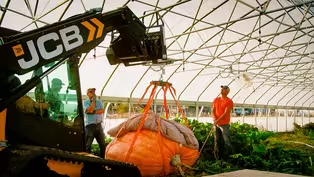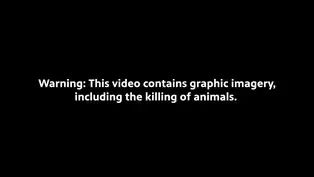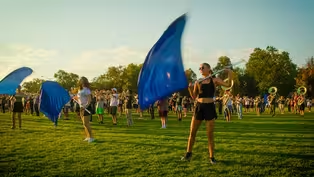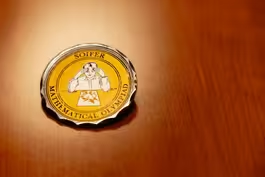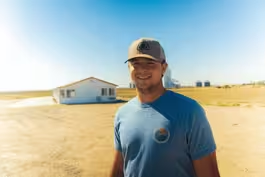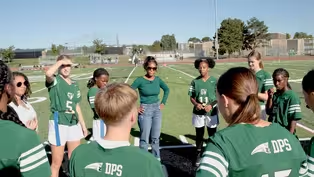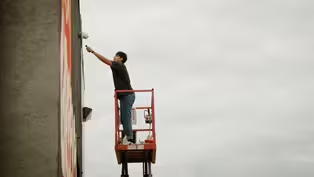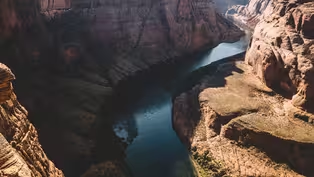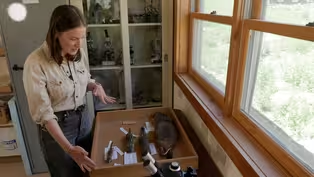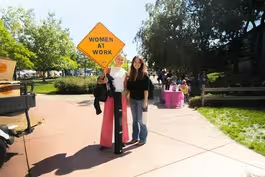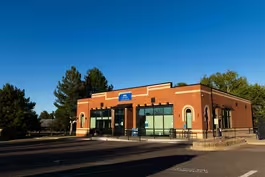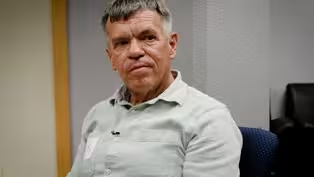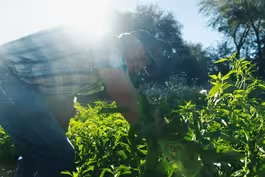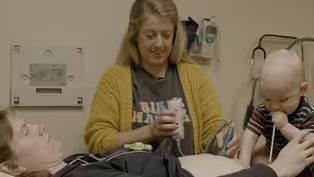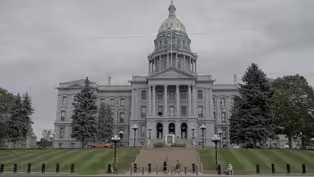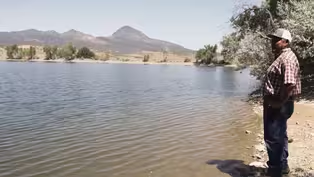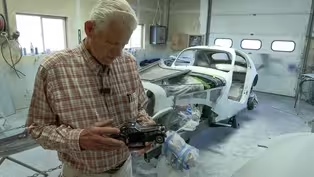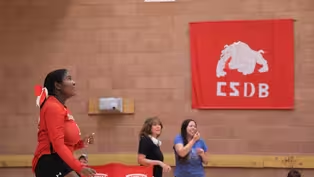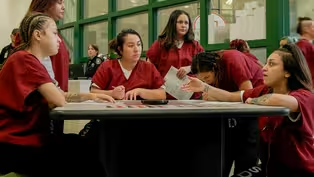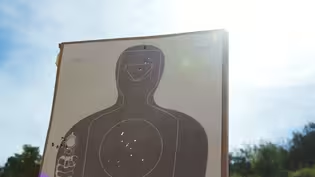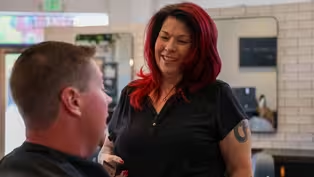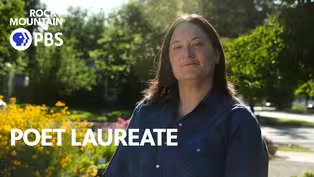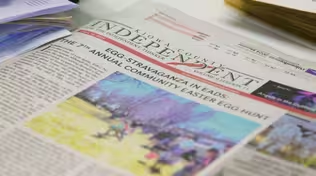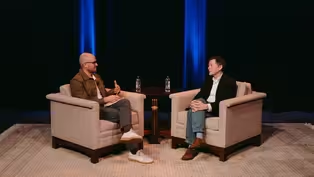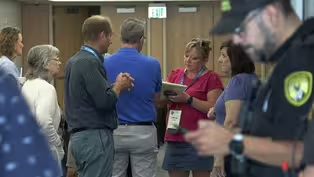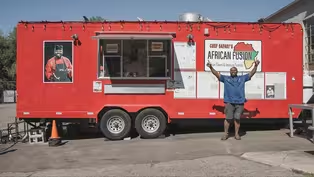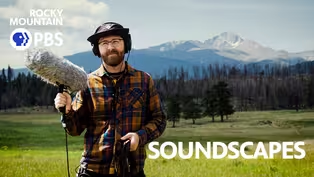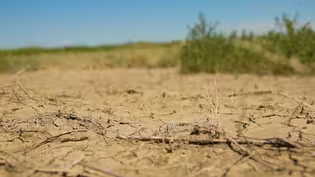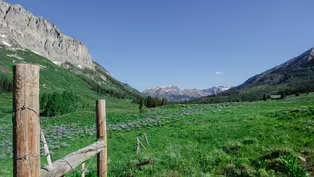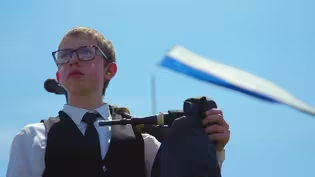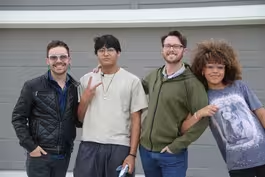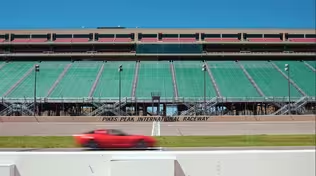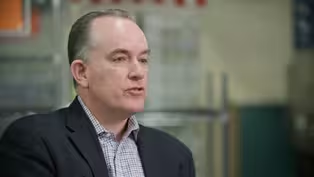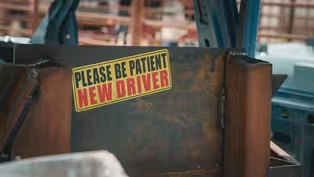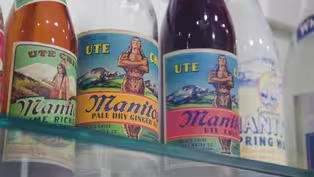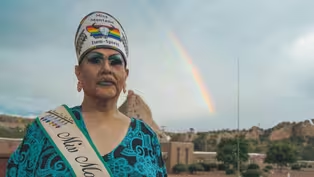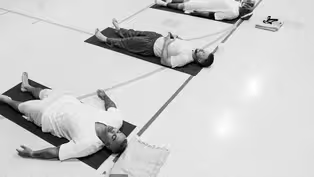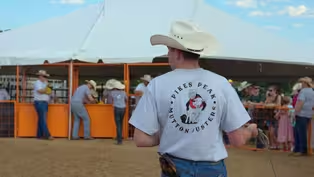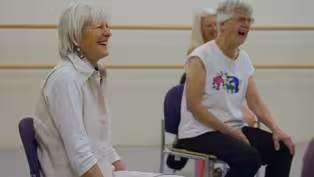A conversation with Dr. Temple Grandin
Clip | 17m 32sVideo has Closed Captions
We sat down with Dr. Temple Grandin to discuss the documentary "An Open Door."
RMPBS' Gabriela Resto-Montero sits down with legendary professor, animal behaviorist, author and autism advocate Dr. Temple Grandin to discuss her work and a new documentary about her life: "An Open Door."
Problems playing video? | Closed Captioning Feedback
Problems playing video? | Closed Captioning Feedback
A conversation with Dr. Temple Grandin
Clip | 17m 32sVideo has Closed Captions
RMPBS' Gabriela Resto-Montero sits down with legendary professor, animal behaviorist, author and autism advocate Dr. Temple Grandin to discuss her work and a new documentary about her life: "An Open Door."
Problems playing video? | Closed Captioning Feedback
How to Watch
is available to stream on pbs.org and the free PBS App, available on iPhone, Apple TV, Android TV, Android smartphones, Amazon Fire TV, Amazon Fire Tablet, Roku, Samsung Smart TV, and Vizio.
Providing Support for PBS.org
Learn Moreabout PBS online sponsorshipI'm Gabriela Resto-Montero I'm the managing editor here at Rocky Mountain PBS.
And this is Dr. Temple Grandin.
Dr. Temple Grandin is a professor of animal science at Colorado State University, where her research on the humane treatment of livestock has changed the way that farming is practiced.
In 1986, she became one of the few public figures in the United States to disclose that she has autism.
In her book, Emergence: Labeled Autistic.
Since then, Dr. Grandin has become an advocate for autism understanding as well as animal welfare.
Her life and work are the focus of a new documentary, An Open Door.
Welcome, Temple Grandin.
-Its great to be here.
Thank you so much for being here with us today.
It's wonderful to be here.
So just to get started, for those of us who may not have seen the documentary yet, can you tell us a little bit about what it's about and what chapter of your life it's covering?
Well, it covers a lot of my teaching at Colorado State University.
I've been at Colorado State University for 34 years, and I think teaching is really important.
And I'd like to emphasize the importance of hands on things.
I think one big mistake that a lot of schools have done is taking out the hands on learning.
One thing that CSU's been trying to do is put hands on learning back in.
We also need to be doing hands on learning with younger kids.
I did see that your latest book, I believe it's called... -Visual Thinking -Yes, Visual Thinking You talk a lot about how children and also children who are neurodivergent learn.
And so is this something that you are kind of addressing in the film and with kids?
-This is something Im really working on right now.
Theres kind of three ways that people can think object visualizers like me, where everything is like a photographic picture, you know, sort of like having your Google images in your mind.
And our kinds of minds are really good at mechanical things, fixing things, animals, photography and art.
Then another kind of thinker is the visual spatial thinker.
This is your mathematician, your musician, they think patterns.
I think in photos, the mathematicians think in patterns, theyre actually different kinds of thinking and theres scientific research that shows that.
And then, of course, you have verbal thinkers, they think in words.
And I've done a lot of talks to businesses, and that's the first step, is you have to realize that different kinds of thinking exists.
Like, for example, my situation, I didn't know that other people were verbal thinkers until I was in my late thirties.
It was a shock to find that out.
But we need the different kinds of thinkers because they bring different kinds of skills into whatever you're working on.
You mentioned that you didn't learn that there were verbal thinkers until your thirties, and so we're always learning new things, especially about the way that people think.
Is that something that when you're talking about hands on learning that you're wanting to see more of... -Well, the visual thinkers are going to really thrive with the hands on learning.
And I'm worried that they're getting screened out of our educational system because they can't do algebra.
But I've worked with brilliant people that are building beef packing plants who graduated from high school and then designing entire factories because they can see how mechanical things work.
And I worked in heavy construction for 25 years, mainly in the 70s, 80s, and the early 90s.
And the object visualizers I worked with then they've all retired out.
They're not getting replaced.
You know, in talking to people in the schools, there's a lot of people in schools pushing algebra because they think you need algebra for logical thinking, you know?
But that's not how I think.
I just see how something works.
Now, help me with animals, because I looked at what animals were seeing.
And we're going to need our visual thinkers.
-Yes.
-When you want to have lights on, have water in your building, you're going to need those visual thinkers that are terrible at algebra.
Yes, As someone who is terrible at algebra, I am definitely looking forward to a place where there's more room for people who are thinking in a different way.
And there's certain fields you absolutely need higher math for.
Absolutely.
But the thing I would recommend is instead of making everybody take algebra, how about geometry?
Or how about business math, or accounting, or maybe statistics?
Yeah, I think... Are you finding that when you say these things about the way that you were able to learn, the supports that you had when you were able to learn, are parents, teachers being receptive?
And do you interact with a lot of kids... -Well I talk to a lot of parents I talk to a lot of teachers and I'm very worried that, you know, I'm seeing veterinary tech students on their third algebra class.
Well, I've watched them spay at dogs over at the SPUR center I don't see what algebra has to do with spaying a kitten, very meticulous work.
Now, there's other things you need algebra for - chemistry but not spaying a kitten.
And I stand in those windows and I watch.
And I think, what's algebra have to do with this?
And, you know, it's a very delicate skill is what they have to have.
An experiential skill that you learn by... -That's right.
But I'm worried that you're probably screening out some of the best veternarians.
Because they cant do algebra.
And I worked with that are building entire beef plants, and they can't do algebra.
They can do arithmetic just fine.
And they have a whole bunch of patents.
A whole bunch of patents.
What worries me is they're not getting replaced.
I saw that one of the clips from the documentary you were talking about how you really want to open doors for for kids who are different, for kids who think differently?
And we need these skills.
We need the skills.
I do a lot of travel, and I'm seeing many, many questionable elevators that I know are not being serviced.
Yeah, That'd be a perfect skill for an autistic kid.
He's going to love elevators.
And hes going to make sure they work.
And the other good thing about the hands on job is AI is not going to replace them.
That's true.
You need somebody who knows exactly how elevators work, who can work in there, get in there, service them, design them.
People talk about everything should be computerized.
The elevator maybe controlled by a computer.
But until we get antigravity like Star Trek, it's going to be a mechanical device.
That's right.
Is that kind of borne out from your experience as well, from your educational experience?
Because when I first started working on my cattle handling stuff, I discovered this whole thing called industrial process equipment.
That's all done by the shop people.
And sometimes degreed engineers would go, they just manufacture equipment.
No, I've worked with people that barely graduated high school that were inventing and patenting equipment, and it's still being used in the beef industry today.
Do you think that there's a lot of positive reception to your message?
Well, I think we need to be looking at all the resources.
Because a lot of equipment we need in the food industry is coming out of Italy, Holland, Denmark, other places, because in ninth grade, those kids can go the university or tech route and they don't look at the tech route as something lesser.
And, some teachers say, well, stupid kids take shop.
Well, what they don't understand, it's a different way of thinking.
It's a different way of problem solving.
The first step is you have to realize that different thinking exists.
When a kid gets a label, autism, dyslexia, ADHD, they tend to be an extreme object visualizer.
Or they might be an extreme mathematician.
You can get them both ways.
And A lot of normal people are more mixtures in the middle.
But when I was out working on those construction projects, I'm going to estimate 20% of the people I worked with were either autistic, dyslexic or ADHD We need the skills, pure and simple.
So does that happen in the home?
Does that happen by changing the way the classrooms function?
Well, the other thing is that I was at the exceptional rodeo today.
The thing, that's a really fun event for kids with various special needs is they're getting those kids out, doing things, riding stick horses or riding a little seesaw horses, things like that.
And it shows parents what their kid can do.
Yes, I'm seeing a lot of kids today get a label.
They kind of don't think the kid can do anything.
And I've seen autistic kids that were fully verbal where they never went shopping.
They never ordered food in a restaurant.
The parents are doing it all for them, so they don't think their kid can do anything.
And one of the most valuable things that probably had happened at that special needs rodeo is it shows families what their kid can do.
And they were having so much fun.
It was just wonderful.
Is that one of your favorite experiences to, you know, when you're working with kids or when you're meeting kids, you have a lot of children's books that are about your life.
I also have two kids project books called Calling All Minds, which is parachute and kite projects that I did as a child.
But we've got kids growing up today that have never used a ruler or tape measure.
I had a college student in my class, my livestock and handling class, who had never measured anything in her life.
I find that just unbelievable.
Yes, I think that would be very hard to be in your class and not know how to do that.
Well, they have to do a scale drawing in my class, and students will ask me, what good is that skill?
I said, well have you ever remodeled your house?
Getting new furniture.
One really good idea to measure things, to just get out there and start experimenting with things.
And I would spend hours, as a kid tinkering around with little parachutes and things, and kids aren't doing that sort of thing today.
And the other book, the Outdoor Scientist looking at plants, observing animal behavior, looking at the stars and getting kids out, doing things.
I didn't have that that hands on learning at all.
Moving on, You also wrote a book called Autism and Education: The Way I See It that also, I would imagine, has overlap with this idea about -Well, thats aimed especially at parents of a three year old thats newly diagnosed.
You know, what do you do?
Right.
There's a lot of controversy about different educational programs.
And I just say, well, if you had a three year old talking, what do you want that autistic three year old to do?
I want them to talk better.
Learn how to take turns games, wait and take turns at games.
And the other big thing is skills.
Things like putting on the coat, eating with utensils, just basic skills.
And you should do it in a fun environment where the kid will make progress.
Practical life skills.
Yeah, there's not enough emphasis on life skills.
Academics is important, but actually I had a really bad time in school.
I got kicked out of ninth grade for fighting, throwing a book at a girl who called me a retard.
Went to special boarding school and they put me to work, running a horse barn and cleaning nine stalls every day.
And the headmaster, said, let her get through her adolescence she can make up the academics later.
That's what I did.
But I've learned how to work, this is the other problem, Kids today are not learning how to work.
And it doesn't matter what job it is.
It also sounds like you had a good support in your in your teacher.
I had some very good teachers.
My mother always pushed me.
She taught me to read when I was eight.
Great elementary school teacher.
I had a great science teacher who finally got me motivated to study by making that a pathway to a goal.
I see.
By making it practical once again.
Well, then, there was a reason for it.
Because if I want to become a scientist, I had to study.
That's right.
And your your path to becoming a scientist, some of your research was the first of its kind in terms of showing the way that livestock is able to discern shapes, shadows, things like that.
- I was one of the first people to look at what cattle were looking at and it would interfere with their movement through a facility.
Also, one of my first graduate students, did some of the very first cattle temperament work.
This was radical like 30 years ago, right?
To think that cattle that jump around in squeeze chutes and get excited are going to have lower weight gain.
They did.
And now I was when I was doing my research for this interview and I was reading up about this study and the work that you've done, it did strike me that it was radical for its time.
But now it's been accepted.
- Its totally mainstream now.
But back in the early nineties, I wasn't allowed to use the word fear in my papers.
I had to call it agitated behavior.
Interesting.
‘Fear was considered anthropomorphic.
Now the word ‘fear is used.
Also, they didnt use the word ‘personality to describe animals.
their done that 30 years ago.
I wouldnt have dared done that 30 years ago.
Has it been satisfying then to see that your work has been adapted in this way?
And then I, on the animal welfare, I developed a very simple auditing system for assessing animal welfare at the meat plants.
I designed a lot of equipment thats in the big meat plants center-track restrainer system, All the big plants have it, I worked on developing that In the eighties, the early nineties.
It's remarkable the impact that your research has had.
Well, people ask me, Well, how did I manage to make a difference?
Very targeted.
You see, verbal thinking is very top down, big broad concepts.
But how do you implement it?
I'm a bottom up thinker, so I picked up something specific like cattle handling to work on not just say, well, everything's terrible.
Work on something specific that where you could actually change it.
You have a quite large body of work books, academic articles, other kinds of articles.
Just to switch gears a little bit, just because you've also made many TV appearances, this documentary is kind of like the latest film about your life.
You've had fictional films about your life.
That's also a completely different skill set for how to be out there in the world.
Have you kind of developed some surprising skills in that way, or has it surprised you?
-There used to be two things I was terrified of airplanes, and this is back when I was in my twenties and public speaking.
I learned in public speaking have really good slides.
Then if you panic, you go to the next slide.
Yeah.
And when I'm on my cattle stuff, I had really good slides.
I was a good photographer.
I had good slides.
Yes.
I was nervous to interview you today.
So I have my notes right here that I can keep going back to if I lose my place.
-Thats what I do when I have to do a talk about slides, I make like a checklist of bullet points that I'm going to go over.
That's right.
We're on the same page there.
I wanted to just kind of switch gears a little bit because on the on the topic of films, I saw that you also are a fan of country Western music and that you like sci fi films and that you're a member of the Academy of Arts and Sciences.
So classic Star Trek really into that.
Spock, Captain Kirk.
Have you have you seen Well, because I saw that you were a member of the Academy of Arts and Sciences and you're an Oscar voter.
I wondered if you had any favorite movies that you've seen recently?
-Ive always been fascinated by the movie Space Odyssey and Hal the computer.
Yeah, that's a good one.
Yep, that's right.
Now, with AI coming Well, he was instructed to never lie and he couldn't tell the astronauts the purpose of the mission.
He wasn't given Asimovs rules of robotics that you never, ever harm human beings.
so that's like your all time favorite.
Yeah, that was 1968.
And then I was watching Star Trek at the time, my favorite show.
I loved Mr. Spocks logic.
That makes sense.
Well, our time is kind of running short, and I know that we've covered a breadth of topics, but is there anything that youd like to add?
-The movie really concentrates on work that Ive done in teaching.
I had a chance to go back to my childhood home that was really intersting to see that, and the field where I used to fly kites now has houses built all over it.
Which I didn't really enjoy seeing that because I had lots of good times playing out the fields in the fifties, kids just went out and played outside and made up our own games.
And yeah, I just go fly my kite on the hill across the street and I'm not going to do that now.
Do you get to fly your kite where you live now?
Theres a very nice field right behind where I live and I never see any kids playing on it.
Now, as a child, kids were just outside playing all the time.
Theres a bunch of houses right near where I live theyve got a really nice fenced playground, almost never see kids on that, theyre only on their devices.
No, we need to be getting them out, doing things.
Is that what you would say to parents?
Put your kids out there.
I would never recommend banning devices.
No, you never would do that.
An hour a day, week, 2 hours on the weekend for TV.
That was the rules I had, then it was to go outside, do stuff.
I think thats a great note to end on, Go outside and do stuff.
Thank you so much for your time, Dr. Grandin, I really, really appreciate it.
It's a pleasure to meet you.
Thank you.
When life gives you a house, move it.
Video has Closed Captions
Clip | 1m 30s | Owning a home had always seemed impossible. Then a historic cabin became available. (1m 30s)
Meet the election judges behind La Plata County’s voting process
Video has Closed Captions
Clip | 4m 26s | Selected community members in La Plata County began training as election judges. (4m 26s)
Sheldon Nuñez-Velarde: Master Potter of the Jicarilla Apache Nation
Clip | 5m 45s | The Jicarilla Apache honor their longstanding relationship to the natural world. (5m 45s)
Rowena Mora: Master Basket Weaver of the Jicarilla Apache Nation
Clip | 4m 27s | The Jicarilla Apache honor their longstanding relationship to the natural world. (4m 27s)
Plant Medicine of the Jicarilla Apache
Clip | 3m 27s | The Jicarilla Apache honor their longstanding relationship to the natural world. (3m 27s)
The Jicarilla Apache Creation Story
Video has Closed Captions
Clip | 4m 57s | The Jicarilla Apache honor their longstanding relationship to the natural world. (4m 57s)
Clip | 5m 37s | The Jicarilla Apache honor their longstanding relationship to the natural world. (5m 37s)
Ducklings Told to Protect the Lake
Clip | 2m 35s | The Jicarilla Apache honor their longstanding relationship to the natural world. (2m 35s)
Video has Closed Captions
Clip | 4m 58s | Inside the high-stakes world of competitive pumpkin growing (4m 58s)
Temple Grandin analyzes undercover video taken inside Superior Farms slaughterhouse Denver
Video has Closed Captions
Clip | 1m 54s | Undercover video taken inside Denver's Superior Farm plant with commentary from Temple Grandin (1m 54s)
The costuming family behind 60 years of handmade costumes in Colorado Springs
Video has Closed Captions
Clip | 4m 56s | The Saunders family once operated one of the largest custom costume shops in Colorado Springs (4m 56s)
Voters to decide fate of Denver's only slaughterhouse
Video has Closed Captions
Clip | 8m 14s | Superior Farms, the city’s only slaughterhouse, would be shut down if voters pass Ordinance 309. (8m 14s)
Keeping tradition alive with the CSU marching band
Video has Closed Captions
Clip | 2m 49s | Inside the Colorado State University marching band. (2m 49s)
After 40 years, one of Colorado’s most challenging math competitions may be coming to a close
Video has Closed Captions
Clip | 5m 19s | UCCS mathematics professor Dr. Alexander Soifer's Soifer Mathematical Olympiad turned 40 this year (5m 19s)
Behind the scenes at the Maurice Sendak exhibit
Video has Closed Captions
Clip | 3m 37s | Behind the scenes preparing for Denver Art Museum’s Maurice Sendak “Wild Things” Exhibit (3m 37s)
Video has Closed Captions
Clip | 3m 5s | The Kit Carson Café fills stomachs, job boards and the need for community gathering spaces (3m 5s)
Inside Colorado's newest high school sport: girls' flag football
Video has Closed Captions
Clip | 2m 44s | Inside Colorado's newest high school sport: Girl's flag football (2m 44s)
Painting a mural from start to finish
Video has Closed Captions
Clip | 2m 31s | Greeley painter, Alonzo Harrison, hits his stride in a new mural at WeldWalls festival. (2m 31s)
Video has Closed Captions
Clip | 2m 9s | Southern Ute Vice Chairman Lorelei Cloud explains the importance and sacredness of water to all. (2m 9s)
Video has Closed Captions
Clip | 4m 11s | Studying the ecological importance of ground squirrels at the Rocky Mountain Bio Lab. (4m 11s)
Video has Closed Captions
Clip | 3m 8s | Over 1700 elementary to high school girls explore careers in transportation and construction (3m 8s)
New suburban opioid treatment clinics aim to address a less visible need outside Denver
Video has Closed Captions
Clip | 2m 29s | Community Medical Services, an addiction treatment program, is opening six new suburban locations (2m 29s)
How Coloradans are working to overcome the political divide
Video has Closed Captions
Clip | 4m 8s | Braver Angels uses cross partisan conversations to overcome political divides. (4m 8s)
Chile farmer and cofounder of the Pueblo Chile & Frijoles Festival Dr. Mike Bartolo
Video has Closed Captions
Clip | 3m 21s | The retired CSU Fort Collins researcher has spent decades developing new types of chile peppers (3m 21s)
Colorado rural hospital relies on nurse midwives to provide quality care, keep costs down
Video has Closed Captions
Clip | 4m 30s | Call the Midwife: Colorado rural hospital leans on nurse midwives for quality care, lower costs (4m 30s)
How a measure makes it onto Colorado's election ballot
Video has Closed Captions
Clip | 4m 23s | Here's how an initiative goes from an idea to a ballot measure (4m 23s)
Water project advances Tribal sovereignty, lifts communities in Four Corners region
Video has Closed Captions
Clip | 3m 31s | A look at how The Dolores Project changed lives in the Colorado Ute communities. (3m 31s)
The secret collection in Rangely that they don't want to keep under wraps
Video has Closed Captions
Clip | 2m 38s | Everyone has a hometown, but not all have a car museum the size of a football field in them. (2m 38s)
For Colorado’s deaf high school volleyball players, the mindset is still the same
Video has Closed Captions
Clip | 4m 39s | The over 65 year-old volleyball program for deaf students starts the high school season (4m 39s)
First-of-its-kind mandate requires in-person voting in Colorado jails
Video has Closed Captions
Clip | 3m 33s | This election, every jail in Colorado will hold an in-person voting event for eligible voters. (3m 33s)
Why some Colorado schools have staff in firearms training
Video has Closed Captions
Clip | 5m 52s | Schools, particularly in rural areas, consider training and arming school staff (5m 52s)
This Denver barbershop is staffed by formerly incarcerated barbers
Video has Closed Captions
Clip | 2m 51s | R&R Head Labs hires formerly incarcerated barbers (2m 51s)
Video has Closed Captions
Clip | 2m 42s | How poetry provided an outlet to Fort Collins Poet Laureate, Melissa Mitchell. (2m 42s)
Video has Closed Captions
Clip | 4m 36s | Local newsrooms in Colorado are shrinking at alarming rates (4m 36s)
Ken Burns on his new film, "Leonardo da Vinci"
Video has Closed Captions
Clip | 36m 7s | Ken Burns met with Rocky Mountain PBS to discuss his latest documentary on Leonardo da Vinci (36m 7s)
Election officials held a secret conference in Grand Junction amid security concerns
Video has Closed Captions
Clip | 2m 43s | As conspiracy theories and lies about elections spread, the job of county clerk gets more stressful. (2m 43s)
Chef Safari brings a taste of Africa to Durango
Video has Closed Captions
Clip | 3m 14s | Chef Safari brings African fusion cuisine to Durango, blending global flavors with cultural roots. (3m 14s)
Meet the sound artist who's exploring the symphony of nature at Rocky Mountain National Park
Video has Closed Captions
Clip | 3m 37s | Meet the sound artist who's exploring the symphony of nature at Rocky Mountain National Park (3m 37s)
Water to water, dust to dust in the Arkansas Valley
Video has Closed Captions
Clip | 4m 4s | Agriculturists unite with ag workers to sustain farms and farm towns in the Arkansas Valley (4m 4s)
Branching out: How one family’s science roots continue to spread
Video has Closed Captions
Clip | 4m 57s | The Inouyes have been doing science for more than 50 years up in Gothic. (4m 57s)
The Colorado Youth Pipe Band is training Colorado’s next generation of bagpipers
Video has Closed Captions
Clip | 3m 23s | The Colorado Youth Pipe Band is training Colorado’s next generation of bagpipers (3m 23s)
A Colorado LGBTQ couple's journey from foster care to adoption
Video has Closed Captions
Preview | 5m 9s | Meet this LGBTQ+ family and their journey through the foster care system (5m 9s)
NASCAR or family car? Street racers hit the track
Video has Closed Captions
Clip | 3m 50s | Can racing on designated tracks curb illegal street racing? Local police hope so. (3m 50s)
Video has Closed Captions
Clip | 4m 43s | Matt Crane explains why election results in Colorado are reliable. (4m 43s)
Inside the tight-knit family of demolition derby
Clip | 2m 47s | For decades, Greeley, Colorado has gathered to enjoy demolition derby. (2m 47s)
What’s the big deal about Manitou’s mineral springs?
Video has Closed Captions
Clip | 5m 13s | Manitou’s namesake water feature has shaped the town geologically, economically and culturally (5m 13s)
Somewhere Over the Rainbow: Pride and Drag in Navajo Nation
Video has Closed Captions
Clip | 4m 40s | On the last weekend of June, Navajo Nation celebrated Diné Pride at its capital. (4m 40s)
Video has Closed Captions
Clip | 5m 4s | Incarcerated students find physical and spiritual healing in yoga program (5m 4s)
Baa Baa Buckaroos continue Mutton Bustin’ tradition at Pikes Peak or Bust Rodeo
Video has Closed Captions
Clip | 4m 7s | The next generation of rodeo stars get their start on the backs of sheep (4m 7s)
Dancing with Parkinson’s, without limits
Video has Closed Captions
Clip | 4m 1s | Boulder residents with Parkinson's disease find relieve and community in free dance class. (4m 1s)
Providing Support for PBS.org
Learn Moreabout PBS online sponsorship
- News and Public Affairs

Top journalists deliver compelling original analysis of the hour's headlines.

- News and Public Affairs

FRONTLINE is investigative journalism that questions, explains and changes our world.












Support for PBS provided by:
